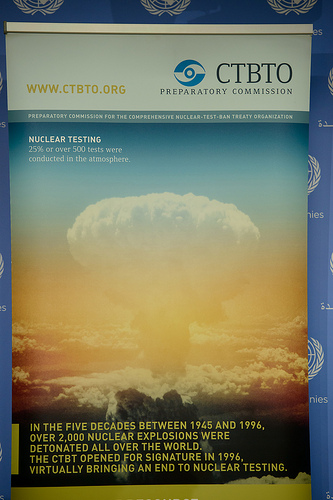
On 24 March 2016, the VCDNP hosted a panel discussion entitled "CTBT at 20: Re-Energizing the Global Debate", which took place in the Conference Hall of the Permanent Mission of Japan. The eight panelists were:

The discussion was moderated by Laura Rockwood, Executive Director of the VCDNP. In her introductory remarks, Ms. Rockwood highlighted the importance of adopting forward-looking measures to ensure the entry into force of the CTBT, a treaty that could serve as an instrument of peace. Dr. Zerbo underlined the achievements of the Preparatory Commission of the Comprehensive Nuclear-Test-Ban Treaty Organization (CTBTO). The Preparatory Commission has managed to establish an impressive verification regime, which is nearly completed, and which is functioning to perfection. "You can't stop the monitoring system. It is impossible to interrupt this machine", Dr. Zerbo reiterated throughout his speech. He invited the members of the audience to imagine what the world would look like without the CTBT. In his opinion, there would have been more nuclear tests in the last 20 years. He further elaborated this concept by debunking the notion that it is possible to develop a nuclear weapon through computer modeling only. However, he stressed that the preliminary successes of the CTBTO should not be used as an excuse by States to stop building the planned monitoring stations. "The heart bleeds", he said, because of the lack of progress of "eight countries [that] hold the international regime hostage". Since there can be no alternative to bringing the Treaty into force, Dr. Zerbo exhorted the eight "missing pieces of the puzzle" to share their concerns with the CTBTO. The world should not wait for a nuclear crisis before achieving entry into force of the CTBT.

Ambassadors Kitano and Sarybay, who co-chaired the 2015 Article XIV Conference, referred to the importance of continuing support for the CTBT ratification process. Ms. Kane pointed out that the CTBTO was "a victim of its own success": since everyone takes it for granted, there is no perceived urgency to achieve universalization of the Treaty. Ambassador Zaroug pointed out that the CTBTO had built a scientific infrastructure that is needed and can be useful to every State. Indeed, Ambassador Zafary-Odiz said, the successful on-site inspection held in Jordan in 2014 should be recognized as a positive sign. On a similar note, during the discussion, Counsellor Omari asserted that the tests conducted by the Democratic People's Republic of Korea (DPRK) had proven the effectiveness and importance of the CTBTO. The DPRK is the only exception in a system, which has otherwise significantly restrained other States from "going nuclear". In addition, the successful conclusion of the 2014 Integrated Field Exercise that was conducted in Jordan demonstrated the progress that the CTBTO has made in developing its on site inspection capabilities. Ambassador Kitano noted, furthermore, that other positive developments, such as agreement on the Joint Comprehensive Plan of Action with Iran, could create momentum for even greater progress in the future. However, he remarked, after 20 years, "if we cannot materialize it [CTBT], we can't do anything". Indeed, a number of contentious issues emerged during the panel, showing just how difficult it is to agree even on what should be discussed, such as the importance of a linkage — or lack thereof — between the CTBT and the Treaty on the Non-Proliferation of Nuclear Weapons (NPT), and the relevance of regional security issues.

Significantly, the majority of the panelists agreed on the importance of active engagement by civil society and the public in order to achieve entry into force of the CTBT. The public must be made aware of the ongoing discussions. The global debate, in fact, should not only be re-energized among experts, but also within the public at large. It was generally agreed that, if civil society today were as active on disarmament and non-proliferation issues as it had been in the past, politicians could not ignore its voice. Ambassador Kitano argued that public awareness was as important as political support, which can be fostered through high-level meetings, panel discussions and symposia. Ambassador Zaroug went as far as to suggest that governments tend not to take decisions unless pressure is coming from outside, and subsequently called for the launch of an international civil society campaign in favor of the CTBT EIF.

On the concrete issue of ratification, some interesting remarks were made by the panelists. Ambassador Merav Zafary-Odiz stated that, for Israel, "it is not a question of if, but of the right timing", since Israel had signed the Treaty with the clear intention of later ratifying it. Chargé d'Affaires Schofer argued that ratification by Annex 2 States should not be achieved by shaming them, but through persuasion. Ambassador Sarybay argued that attention should be focused particularly on those countries, which had not yet signed the Treaty. Ms. Kane stated that some form of pressure should be put on all States that had not ratified the CTBT in order to re-energize the debate and gain momentum. Other speakers agreed that the Treaty should be promoted in a variety of international fora.